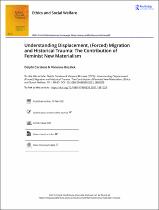Understanding Displacement, (Forced) Migration and Historical Trauma: The Contribution of Feminist New Materialism
Abstract
Feminist new materialist theory has taken up the challenge of reconfiguring politics, ethics and justice in ways that critically account for contemporary forms of materiality, affect and embodiment at work in the contemporary world. There is much at stake in such a project. The crisis of displacement, we argue, is the crisis of capitalism as it impacts on the biosphere of planet earth, necessitating an approach that can account for all the processes essential to life and living. In this paper our intention is to suggest ways of understanding displacement that unites social and environmental justice, while simultaneously merging ethical, political, ontological and epistemological concerns. Building on the nexus of capitalism and displacement, we investigate the confluence of the necropolitical (Mbembe 2003) and the necrobiopolitical (Bubandt 2017; Cooper 2008) as we sketch an uncanny tableau of more-than-human displacements across various entangled cenes – the Anthropocene, Capitalocene, Plantationocene, Shadowcene and Chthulucene. Our intention is to displace, trouble and haunt the centrality of the purely human in social work. The unfolding crisis of capitalism, we argue, is a crisis of displacement for all forms of life; a crisis that necessitates troubling humanist formulations of justice, care and ethics.

